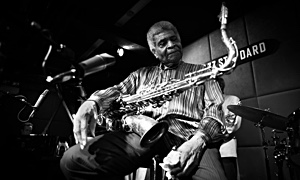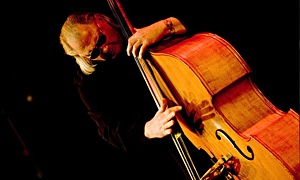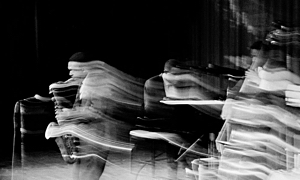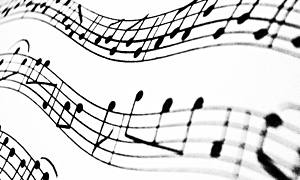Home » Jazz Articles » On and Off the Grid » Why Jazz?
Why Jazz?
It was clear to me... that I had to spend the rest of my life doing what I loved and I had to trust that the music would take care of me—I went with my passion.
—Oliver Lake
George Coleman
 Once I was in HS my learning of the instrument (alto sax was my first and main instrument) progressed very quickly. I was mostly self-taught and within two years I was playing professionally. The music school department head at Manassas High School in Memphis was Matt Garrison (father of Dee Dee Bridgewater) and he was helpful to many of us. Through the school I was asked to write an arrangement for Ray Charles while still in high school (I was 17 I believe). Of course, in that school there were many great musicians at that time like Harold Mabern, Booker Little, Frank Strozier, Louis Smith, Charles Crosby, Jamil Sulieman Nasser and many others. Isaac Hayes was also there, and he called us his mentors and a major influence on his music. My main influence was Charlie Parker and that was who I wanted to be like, but Memphis had a really bustling blues scene so when BB King was looking for someone to play in his sax section my name came up. Ironically at the time he already had an alto player and needed me to play tenor, so he bought me one from a shop and took out the cost of the horn in my weekly salary. That is how and why I became a tenor player, though I always continued to play alto. Interesting to note only myself and baritone saxophonist Floyd Newman are still alive from BB King's band today. Basically, as soon as I showed promise on the alto and became enamored with Bird. I was on course to be a musician and though I considered college, I played football in High School and could have gotten a scholarship to Memphis State or one of the other local universities, but once BB King came a calling the beginning of my dream was realized and once that first road tour started so did my career in earnest. I played on his first hit record/single "Woke Up This Morning." I even had a solo on the track and after that we toured constantly until I left to go to Chicago.
Once I was in HS my learning of the instrument (alto sax was my first and main instrument) progressed very quickly. I was mostly self-taught and within two years I was playing professionally. The music school department head at Manassas High School in Memphis was Matt Garrison (father of Dee Dee Bridgewater) and he was helpful to many of us. Through the school I was asked to write an arrangement for Ray Charles while still in high school (I was 17 I believe). Of course, in that school there were many great musicians at that time like Harold Mabern, Booker Little, Frank Strozier, Louis Smith, Charles Crosby, Jamil Sulieman Nasser and many others. Isaac Hayes was also there, and he called us his mentors and a major influence on his music. My main influence was Charlie Parker and that was who I wanted to be like, but Memphis had a really bustling blues scene so when BB King was looking for someone to play in his sax section my name came up. Ironically at the time he already had an alto player and needed me to play tenor, so he bought me one from a shop and took out the cost of the horn in my weekly salary. That is how and why I became a tenor player, though I always continued to play alto. Interesting to note only myself and baritone saxophonist Floyd Newman are still alive from BB King's band today. Basically, as soon as I showed promise on the alto and became enamored with Bird. I was on course to be a musician and though I considered college, I played football in High School and could have gotten a scholarship to Memphis State or one of the other local universities, but once BB King came a calling the beginning of my dream was realized and once that first road tour started so did my career in earnest. I played on his first hit record/single "Woke Up This Morning." I even had a solo on the track and after that we toured constantly until I left to go to Chicago. Dave Liebman
 Not sure that I chose to be a jazz musician—it chose me! After seeing John Coltrane at 15 years old (February 1962) I wandered around musically, finding myself. When I got the gig in 1969 with Pete La Roca, Steve Swallow, and Chick Corea, I could finally look at myself in the mirror and bask in the sunlight of declaring the fact that I will make my living playing this incredible music. To share the bandstand with Elvin Jones and Miles Davis (1970s) was akin to getting a Masters and Doctoral degree in the real world—I have been blessed!
Not sure that I chose to be a jazz musician—it chose me! After seeing John Coltrane at 15 years old (February 1962) I wandered around musically, finding myself. When I got the gig in 1969 with Pete La Roca, Steve Swallow, and Chick Corea, I could finally look at myself in the mirror and bask in the sunlight of declaring the fact that I will make my living playing this incredible music. To share the bandstand with Elvin Jones and Miles Davis (1970s) was akin to getting a Masters and Doctoral degree in the real world—I have been blessed! Peter Bernstein
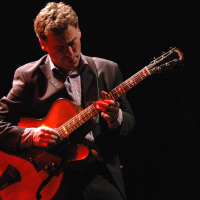 I became consumed by jazz music when I was about 15 years old. I had always loved all kinds of music from as long as I can remember fromScott Joplin the Jackson 5 to the Beatles and Tchaikovsky's Peter and The Wolf. When I discovered jazz, it became the planet I wanted to journey to and make my home. It was the amazing history of genuises and personalities and their connection to the times in which they lived that fascinated me and captivated my heart and stimulated my mind. Louis Armstrong, Duke Ellington, Lester Young, Billie Holiday,, Charlie Parker, Thelonious Monk , Kenny Dorham, Wes Montgomery, Miles Davis, Sonny Rollins John Coltrane and so many more became personal heroes and setters of the ultimate standard of artistry and self-expression.
I became consumed by jazz music when I was about 15 years old. I had always loved all kinds of music from as long as I can remember fromScott Joplin the Jackson 5 to the Beatles and Tchaikovsky's Peter and The Wolf. When I discovered jazz, it became the planet I wanted to journey to and make my home. It was the amazing history of genuises and personalities and their connection to the times in which they lived that fascinated me and captivated my heart and stimulated my mind. Louis Armstrong, Duke Ellington, Lester Young, Billie Holiday,, Charlie Parker, Thelonious Monk , Kenny Dorham, Wes Montgomery, Miles Davis, Sonny Rollins John Coltrane and so many more became personal heroes and setters of the ultimate standard of artistry and self-expression. Almost 40 years later, I consider myself incredibly fortunate to still be consumed by this world and have the continued opportunity to endeavor to be better at playing jazz music, which is vast and ever-expanding. The challenges of playing jazz and improvising go far beyond the realm of just making sounds with an instrument and into the challenges of being a human being; trying to better oneself in the context of community and fellowship. Improvising is life! Learning to speak and to listen at the same time is one of the many mysterious polarities in this endeavor. That you are asked to develop an identity but to communicate in real time with others doing the same thing is a beautiful challenge that requires one to be internal and external at once. The challenge of playing in time is the challenge of balancing intensity with relaxation. Learning to be coherent yet spontaneous, to be loose and tight. These are things that you study for a lifetime as they are in step with your growth as a person. Jazz is both freedom and discipline. In the realm of personal expression, I don't know of anything else that one could do that is a more complex and beautiful challenge.
Oliver Lake
 I went with my passion. After flunking out of college in my first year with a major in biology, it was clear to me after that experience that I had to spend the rest of my life doing what I loved and I had to trust that the music would take care of me—I went with my passion.
I went with my passion. After flunking out of college in my first year with a major in biology, it was clear to me after that experience that I had to spend the rest of my life doing what I loved and I had to trust that the music would take care of me—I went with my passion. Vijay Iyer
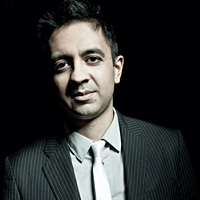 It was a combination of (1) hearing a wide range of music on TV and radio as a kid; (2) already being an improviser on piano, which I played entirely by ear; (3) learning basics of harmony in middle school; (4) being in my high school jazz ensemble, where I got to stumble around with a rhythm section every day for a couple of years; (5) having access to a great record collection at our local library as a teenager (mid to late 80s); (6) seeing a lot of live music in my teens & 20s; (7) being generously mentored by a number of elder Black composer-performers in my 20s and 30s. Without any one of these factors, my life would have turned out very differently!
It was a combination of (1) hearing a wide range of music on TV and radio as a kid; (2) already being an improviser on piano, which I played entirely by ear; (3) learning basics of harmony in middle school; (4) being in my high school jazz ensemble, where I got to stumble around with a rhythm section every day for a couple of years; (5) having access to a great record collection at our local library as a teenager (mid to late 80s); (6) seeing a lot of live music in my teens & 20s; (7) being generously mentored by a number of elder Black composer-performers in my 20s and 30s. Without any one of these factors, my life would have turned out very differently! Mike Clark
 My father was a drummer although he quit in his early twenties. He had a hell of a jazz record collection and there was always a set of drums around the house. Before I could walk, I must have internalized the music as he had his friends over to party and he played jazz records constantly. At four I made my way to the drums and could somehow played a Gene Krupa like tom-tom solo without any instruction. My dad flipped when I did this and he took me to a nightclub where his friends were playing that same night. I sat in and played "Sweet Georgia Brown" and even played a solo.
My father was a drummer although he quit in his early twenties. He had a hell of a jazz record collection and there was always a set of drums around the house. Before I could walk, I must have internalized the music as he had his friends over to party and he played jazz records constantly. At four I made my way to the drums and could somehow played a Gene Krupa like tom-tom solo without any instruction. My dad flipped when I did this and he took me to a nightclub where his friends were playing that same night. I sat in and played "Sweet Georgia Brown" and even played a solo. Spending my childhood going to jazz clubs with my dad, was a weekly occurrence. He would pay the band leader or drummer $5 and they would let me sit in. He was a railroad man and we traveled the country hitting jazz clubs in each state. By the time I was about ten he was getting calls from some of these musicians we had met and from some club owners to have me in as a kind of novelty guest soloist and I got paid.
My jazz record collection was now expanding into Art Blakey, Charlie Parker etc. Around 11 or 12, I was trying to play bebop. By the time I was in high school I was working quite a bit and making some nice money. Soon after high school I joined Vince Guaraldi's band then a few years later I became part of Herbie Hancock's group. I have kept playing my entire life and still have a busy schedule playing and recording.
Susan Alcorn
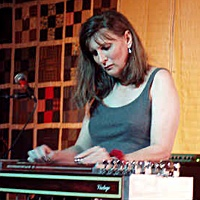 The definition of "jazz" is a slippery one, and I'm not sure that the music I play fits neatly into that category (but does any music with any category?). For as long as I can remember, I've had an ear for, an affinity for, music that sounded different from what most people were listening to. I liked various world folk music's, 20C classical music, free jazz along with its antecedents, and improvisation, improvisation being what for me has tied all these genres together. I especially love improvising with other musicians and the excitement of making music that is completely without precedent. I love the way the music flows with one or more people finding their way through a completely uncharted musical territory, often playing in ways that never occurred to you before. And I love those surprising moments of beauty you suddenly come upon, take a breath, then move along. To some extent, all music is improvised (we are not robots, at least not yet), and in that respect, I love all music.
The definition of "jazz" is a slippery one, and I'm not sure that the music I play fits neatly into that category (but does any music with any category?). For as long as I can remember, I've had an ear for, an affinity for, music that sounded different from what most people were listening to. I liked various world folk music's, 20C classical music, free jazz along with its antecedents, and improvisation, improvisation being what for me has tied all these genres together. I especially love improvising with other musicians and the excitement of making music that is completely without precedent. I love the way the music flows with one or more people finding their way through a completely uncharted musical territory, often playing in ways that never occurred to you before. And I love those surprising moments of beauty you suddenly come upon, take a breath, then move along. To some extent, all music is improvised (we are not robots, at least not yet), and in that respect, I love all music. Dom Minasi
 Jazz was not music that was listened to in my house. My father preferred opera and my mother listed to the pop music of the day. My guitar teacher played improvised solos on tunes he gave me and I would ask him, "What is that?" and he would say. "It's called Jazz." And I would ask, "How do you play that?" and he'd would answer, "it comes from the heart." At 11 years old I thought it will strike me like a bolt of lightning and I'll suddenly just be able to play jazz, but surprise, surprise! It didn't happen. When I went to high school, I joined the swing/jazz band. At a rehearsal at Mike Simonetti's house, Mike put on "Johnny Smith's Moonlight in Vermont." I listened with my mouth wide open. I had never heard guitar played like that. Very soon after I read in the local newspaper that Johnny was playing at Birdland. I begged my father to take me. He did. We sat in front. I watched this amazing man play. Right then and there I decided I wanted to be a jazz musician. That was 1958. I mostly learned how to improvise by watching and listening to the best jazz players in the world. You see Birdland had a peanut gallery in the back of the club for teenagers. I told my parents I was going to the movies and I'd hop on an A train and go to Birdland. I really didn't consider myself a jazz player until my mid-twenties and even though I had to play other music throughout the years to survive, for the last 40 years all I do is play and record jazz.
Jazz was not music that was listened to in my house. My father preferred opera and my mother listed to the pop music of the day. My guitar teacher played improvised solos on tunes he gave me and I would ask him, "What is that?" and he would say. "It's called Jazz." And I would ask, "How do you play that?" and he'd would answer, "it comes from the heart." At 11 years old I thought it will strike me like a bolt of lightning and I'll suddenly just be able to play jazz, but surprise, surprise! It didn't happen. When I went to high school, I joined the swing/jazz band. At a rehearsal at Mike Simonetti's house, Mike put on "Johnny Smith's Moonlight in Vermont." I listened with my mouth wide open. I had never heard guitar played like that. Very soon after I read in the local newspaper that Johnny was playing at Birdland. I begged my father to take me. He did. We sat in front. I watched this amazing man play. Right then and there I decided I wanted to be a jazz musician. That was 1958. I mostly learned how to improvise by watching and listening to the best jazz players in the world. You see Birdland had a peanut gallery in the back of the club for teenagers. I told my parents I was going to the movies and I'd hop on an A train and go to Birdland. I really didn't consider myself a jazz player until my mid-twenties and even though I had to play other music throughout the years to survive, for the last 40 years all I do is play and record jazz.
< Previous
Twelve Bass Tunes
Comments
Tags
On and Off the Grid
Dom Minasi
George Coleman Sr.
Dee-Dee Bridgewater)
Ray Charles
Harold Maybern},} {{Booker Little,
Frank Strozier,
Louis Smith
Charles Crosby,
Jamil Nasser
Isaac Hayes
Charlie Parker
BB King
Floyd Newman
Dave Lieberman
Pete LaRoca
Steve Swallow
Chick Corea
Elvin Jones
Miles Davis
Peter Bernstein
Scott Joplin
Louis Armstrong
duke ellington
Lester Young
Billie Holiday,
Charlie Parker},},{{Thelonious Monk,
Kenny Dorham,
Montgomery,
Miles Davis,
Sonny Rollins},} {{John Coltrane
Oliver Lake
Gene Krupa
Art Blakey
Charlie
Vince Guaraldi's
Herbie Hancock's
Susan Alcorn
Johnny Smith'
For the Love of Jazz
 All About Jazz has been a pillar of jazz since 1995, championing it as an art form and, more importantly, supporting the musicians who create it. Our enduring commitment has made "AAJ" one of the most culturally important websites of its kind, read by hundreds of thousands of fans, musicians and industry figures every month.
All About Jazz has been a pillar of jazz since 1995, championing it as an art form and, more importantly, supporting the musicians who create it. Our enduring commitment has made "AAJ" one of the most culturally important websites of its kind, read by hundreds of thousands of fans, musicians and industry figures every month.





